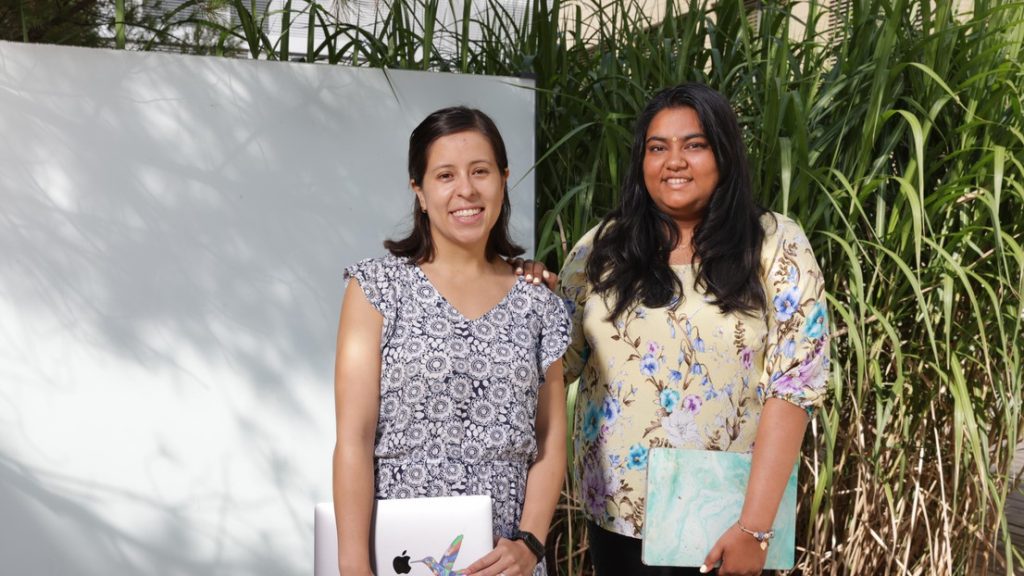Vinitra Swamy and Paola Mejia-Domenzain are the first two graduating PhDs of EPFL’s Machine Learning for Education Laboratory (ML4ED). They are aiming to bring AI-powered upskilling to adult learners.

Vinitra Swamy and Paola Mejia-Domenzain began their doctoral studies together in EPFL’s School of Computer and Communication Sciences in 2020 with a passion to explore how artificial intelligence can advance education through personalization and scalability. They joined Professor Tanja Käser’s Machine Learning for Education Laboratory and became close friends and collaborators.
Swamy has always been fascinated with explainable AI, addressing the question of how we can explain decisions that are made through ‘neural networks’. Although neural networks are widely used as machine learning architectures, they are often referred to as black boxes by researchers.
“We’re working on interpretable-by-design neural networks that don’t compromise on performance or generalizability. I think this is the future of AI – where explainability is baked into model architectures and not tacked on as an afterthought,” she says. “From an education perspective, it’s crucial to be both accurate and explainable, as both are important to making the correct learning interventions.”
Swamy’s recent work focuses on making explanations understandable and actionable beyond a technical audience.
“We’ve seen that teachers are really excited to gain access to these kinds of specific insights about their students,” says Swamy. “They are very enthusiastic about having more information on why models make the recommendations that they do. It makes me optimistic that these tools can be used with effective trust.”
She argues that in its research, the ML4ED laboratory is special in the way that models are put directly in front of real students and educators to learn how they evaluate and engage with the new tools.
For her part, Mejia-Domenzain is interested in using technology for education to reach underrepresented populations to level-up the field aiming to equalize access and outcomes in education.
“There are a lot of people that care about education and technology who want to do something good for the world. I always ask the question ‘how can my work make a positive impact, how can we extend educational opportunities in data science, an increasingly important skill, to underserved populations who typically lack access?’” she said.
Mejia-Domenzain’s research focuses on three important themes: understanding student behavior, empowering teachers with data-driven insights, and delivering personalized interventions. She has developed an unsupervised learning interpretable pipeline for time-series to understand the self-studying and regulation habits of students in different contexts, developed intuitive learning analytics dashboards to enable teachers to have a better understanding of their classrooms to make informed decisions and adjustments, and designed RELEX, a tool to improve procedural writing based on examples that provides tailored feedback on student inputs and prior experiences, aiming to improve both engagement and educational outcomes.
“We have the data science and learning models and we want to put them together into something that has value for society and that can make the world better. I carry the flag that education can be a force for change – we just need to know where and how to apply it correctly,” Mejia-Domenzain says.
According to the OECD, more than one-billion jobs will be transformed by technology over the next ten years and this will require one-billion people to retrain and reskill by 2030.
In response to this, Swamy and Mejia-Domenzain are founding Scholé, an AI for education start-up focused on upskilling for adult learners in the workforce. Scholé is a learning platform that leverages Large Language Models and Generative AI to offer personalized data science and AI upskilling content that has been tailored to a job-relevant context.
“Our AI-tutor, Olé!, helps learners co-design their curriculum through a conversation; behind the curtain, Olé uses a knowledge graph of data science topics to create a learning plan through retrieval augmented generation. We support self-regulated learning through goal setting, progress tracking with friends, and study habit recommendations,” explains Swamy.
For Scholé, the pair has just been selected as a winner of the largest international EdTech competition, the Tools Competition, as part of the “Adaptive and Competitive Workforce” track. They’ve also been selected as global finalists (top 3% of 2230 teams) in MIT Solve’s “Global Learning Challenge”.
Mejia-Domenzain believes part of this success has been due to their human-centric approach to AI.
“We shouldn’t be blinded by technology. Coming from computer science it’s very easy to say, ‘Well, we have the technology! Who cares about the user’s needs? We just want to test it because we think it’s cool’. But all of this is about the people. We believe in always having the user in mind, not losing track of the big picture”
For Swamy, this human element is perhaps the most special thing about her research and the ML4ED laboratory. She describes EPFL as a ‘computer science mountain paradise’.
“Being in Switzerland has honestly felt magical for my PhD. It’s such a beautiful place with such amazing people from different backgrounds and environments, and this has a huge positive impact on the lab culture,” says Swamy. “So much of AI can be about creating the next best model, but when you actually get the chance to put it in front of real users at the intersection of research and use, that is particularly important.”
Author: Tanya Petersen